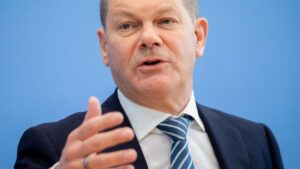
Germany, which recently provided Ukraine with a EUR150 million loan, is rapidly preparing another such loan, German Chancellor Olaf Scholz said at the High-Level International Donor Conference for Ukraine in Warsaw on Thursday.
“We will provide much-needed liquidity to the budget of Ukraine. Recently, a special loan of EUR150 million was allocated. Another loan of EUR150 million is being prepared on an accelerated basis,” he said.
Scholz added that, as part of bilateral development cooperation, Germany had already provided EUR122 million to Ukraine to address the economic and social consequences of the war. “And we intend to provide another EUR140 million for development financing,” the chancellor said.
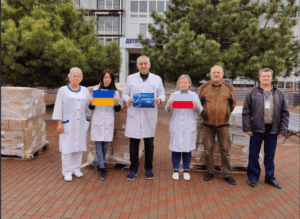
ZDOROVI, humanitarian aid initiators, deliver the necessary medicines and medical equipment to more than 10 regions of Ukraine every day
Last week, the Ukrainian National Humanitarian Aid Agency ZDOROVI received two mobile hospitals from partners in France.
“They will help Ukrainian doctors save lives when every second counts. Rescue them where equipment or facilities are usually lacking to provide the necessary medical care. These mobile hospitals in hot spots are like islands of hope,” the agency notes.
One mobile hospital consists of 7 tents, and its technical equipment allows for the widest range of medical interventions — from surgery for the wounded to help for women in labour. Since Russian occupiers are primarily shooting at peaceful villages and cities, without hesitation to cover even children’s hospitals and maternity hospitals with fire. Most of the civilian hospitals in the battlefields have been destroyed: in particular, according to Serhiy Haidai, head of the Luhansk Regional State Administration, there has not been a single medical facility left in the Luhansk region in the first 43 days of the war. In such conditions, each mobile hospital is able to save hundreds of lives of adult and young Ukrainians.
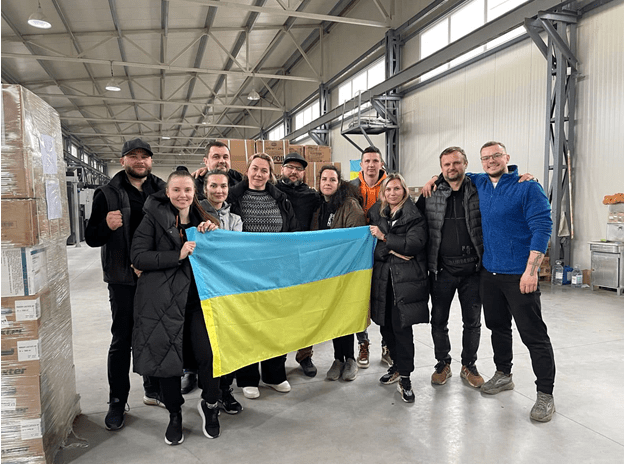
In addition to mobile hospitals, during the war the ZDOROVI agency has already collected more than 100 tons of medicine and medical instruments and delivered them to medical institutions throughout Ukraine. Recent deliveries include Philips patient monitors brought to hospitals in Mykolayiv and Kyiv Oblast, medicines and chemotherapy chairs for the Kirovohrad Oncology Center, and modern medical equipment for the recently liberated Russian hospital in Trostyanets, Sumy Oblast.
Today, ZDOROVI is a team of 16 people, who used to bring into life changes for better healthcare before war, but now they are working 24/7 exclusively to ensure that Ukrainian hospitals and medical centers receive humanitarian aid quickly, on time and in line with their real needs. The National Agency actively cooperates with many countries around the world, including the United States, Germany, France, Switzerland, Great Britain, Poland, Slovakia and others.
“In the first days of our humanitarian mission, we were able to quickly get first aid for hospitals thanks to international organizations with which we previously implemented projects for medicine. However, after that – the list has expanded significantly. Others who wanted to help were convinced that we could be trusted with cargo of any size, regardless of the final destination – even delivering it to frontline hospitals. We can say with confidence that Ukrainian doctors now have a lot of friends in these countries. After all, this is how we call those who come to the rescue during challenging times,” said ZDOROVI.
In Ukraine, from the first days of the war, a large-scale volunteer movement and a humanitarian aid movement were formed. However, to become a part of it, it is necessary to gain the trust not only of donors, but also of the recipients of aid. If the agency managed to receive the first cargo thanks to the previous cooperation with international partners and medical institutions, only trust itself helped to grow to the current scale. It is the result of the most transparent working mechanisms, detailed photo and video reports and constant communication with all parts of the process – along the entire path of the cargo to the hands of the recipients.
The agency comments that an important condition for the well-established work that they needed to do in the first days of the war was the organization of logistics on the territory of Ukraine itself, as well as a system for the effective distribution of the aid received where it is acutely needed. The first person to entrust ZDOROVI with medical aid from abroad, Thomas Humprey, notes:
“What people don’t realise about humanitarian missions with this level of complexity is this: there may be tons of aid coming in, but if those tons don’t reach the places where they are most needed, then the people who need it most suffer”.
According to the agency’s founder Nataliia Tulinova, doctors and volunteers work miracles, saving lives in extreme conditions. But their heroism alone is not enough: Ukraine needs help. We have all done a lot together, we still have many opportunities today, but we need your support – each of you. Every donation you make, be it a financial financial contribution or medical aid shipment, is a chance to save lives of innocent people and another step towards victory over the racist invasion that threatens not only Ukraine but the world!
Join the fundraiser:
PayPal:
https://bit.ly/3vp1hFr
Wise
n.tulinova@zdorovi.agency
+380502720902
Western Union
(USD) Nataliia Tulinova 4130 6301 8002 0811
(UAH) Nataliia Tulinova 4678 0800 9031 0397
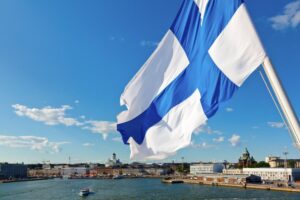
Finland will allocate EUR 70 million in aid to Ukraine and send additional military equipment, Finnish Prime Minister Sanna Marin has said.
“We have made a decision on a further allocation of EUR 700 million to help Ukrainian refugees in Finland. In addition to this, we are currently preparing an additional contribution to cover current needs and assist with reconstruction. The contribution, subjected parliamentary approval, will be approximately EUR 70 million. We have also made the decision today to send additional military equipment to Ukraine,” Marin said at the High-Level International Donor Conference for Ukraine in Warsaw on Thursday.
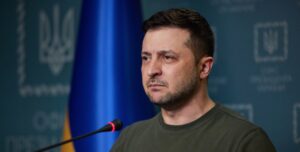
Ukraine needs a strategic plan for international support, it will be a modern analogue of the historic Marshall Plan, President Volodymyr Zelenskyy said while speaking via video link at the High-Level International Donor Conference on Ukraine in Warsaw on Thursday.
“The restoration of Ukraine must now become as historical an example for our time and future as the restoration of European countries after World War II… It will be an investment in the stability of all of Central and Eastern Europe. So that the aggressor knows that he will not break the power of Europe and freer nations that everything that was destroyed by the war will be restored,” Zelensky stressed.
He noted that freedom must demonstrate that it protects and provides people better than tyranny, which for decades has enjoyed a huge flow of money, the sale of oil, gas and other raw materials, which is why this conference is so important for everyone in Europe both strategically and in tactical terms.
Zelensky pointed out that Ukraine now retains full functionality, but needs sufficient financial resources “so that Ukrainian men and women are provided with everything necessary,” and in continuous work, the state, as the manager of these funds, will cover priority defense, social and humanitarian needs.
The President added that a large-scale recovery and reconstruction plan is already being prepared.
If this new Marshall Plan for Ukraine provides for quick and sufficient steps, he said, it will mean that millions of Ukrainians who have been displaced by the war will be able to return home.
“How this brutal war will end is decided not only on the battlefield, but also in matters of economy and finance, and humanitarian support, and in the ability to ensure a normal life in the liberated territories and restore what was destroyed by the Russian army,” Zelensky summed up. .
He added that Ukraine invites its partners – civilized and responsible countries – to take over the patronage of those regions, cities and industries of Ukraine that suffered from the war unleashed by Russia, in order to jointly ensure their full restoration.
“I believe that today Europe will show its strength, you will show your strength, including the strength of international institutions, the UN institutions, whose representatives are now with us … because this is for common freedom,” Zelensky concluded his speech.

The French chain of sports stores Decathlon has resumed work in Ukraine, a website and a store in Retail Park Petrivka are functioning, the retailer said on its official Facebook page.
Orders on the site are reportedly processed from 10:00 to 18:00. The store is open daily from 10:00 to 19:00.
The company said that they are gradually planning to open other stores of the chain.
Decathlon is known as the world’s leading sports retailer, specializing in the design, manufacture and retail of sports goods for over 70 sports.
The first Decathlon store in Ukraine was opened in March 2019 in Kyiv. There are three stores in the Ukrainian capital, as well as one in Odesa. In addition, Decathlon products are available for order in the online store.
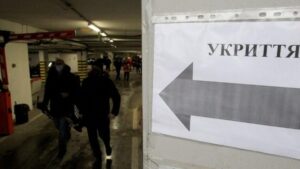
By now, the mobile operator Kyivstar has provided 1,000 bomb shelters all over Ukraine with free home internet.
According to the press service of the company on Thursday, Kyiv, Zhytomyr, Rivne, Lviv, Dnipro, Obukhov, Khmelnitsky, Belgorod-Dnestrovsky, Chernivtsi, Zaporozhye, Lutsk, Nikolaev and others receive this service from the operator.
Every day, the company connects an average of 15 new locations and accepts applications for connection.
According to the operator, in order to apply for connecting a bomb shelter to the Internet, you need to send a request to the email address wifi@kyivstar.net, indicating your contacts and connection address. Within a few days, a technician will provide feedback on connectivity and the required time to complete the request.
Kyivstar notes that today, since the beginning of the war, the company has already provided subscribers with free services worth more than UAH 400 million. In addition, she transferred more than UAH 30 million in charitable assistance for the humanitarian needs of the military, hospitals, the elderly and those affected by the war.